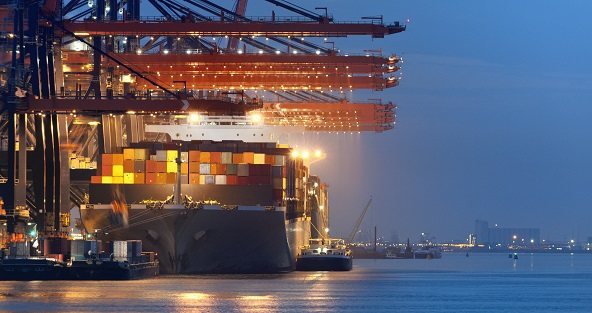Mediterranean Shipping Co. (MSC), the world’s largest ocean carrier, is facing ongoing fallout from multiple drug smuggling cases that occurred over three years ago.
Bloomberg Businessweek published an in-depth investigative report Friday that said the U.S. government is pursuing the shipping giant for $700 million or more in penalties and could move forward with a forfeiture case against the 2018-built container ship MSC Gayane.
Over 20 tons of cocaine worth over $1 billion were found in containers aboard the MSC Gayane in June 2019 when it called in Philadelphia. It marked the largest cocaine seizure in U.S. history.
Also in 2019, 1.6 tons of cocaine were found aboard the MSC Carlotta when it called in Newark, New Jersey; 537 kilograms of cocaine were discovered aboard the MSC Desiree in Philadelphia; Peruvian authorities found 2.4 tons of cocaine on the MSC Carlotta; and Panamanian authorities found 1.3 tons of cocaine on the MSC Avni.
Eight seafarers aboard the MSC Gayane pleaded guilty and were sentenced to a combined total of 50 years in prison. They admitted to using the ship’s crane to load the cocaine from speedboats while the vessel was on the high seas off South America, then hiding the drugs in the ship’s containers.
U.S. prosecutors allege that Montenegrin Goran Gogic — arrested in Florida in October and now in custody in New York — oversaw the logistics of getting the cocaine from South America to Europe (stopping in the U.S en route) aboard the MSC Gayane, MSC Carlotta and MSC Desiree, liaising between crew members involved in smuggling, who were mostly Montenegrins, and Balkan drug cartels.
MSC reputational fallout
The Bloomberg article stated the cocaine smuggling cartel “infiltrated” MSC. William McSwain, U.S. Attorney for the Eastern District of Pennsylvania prior to January 2021, told Bloomberg: “We certainly didn’t see MSC as a victim in all this.”
Robert Perez, a former Customs and Border Protection (CBP) deputy commissioner, told Bloomberg the U.S. government was greatly interested in knowing “how high the influence of the narco-traffickers lay within this company.”
The shipping line responded Saturday: “MSC strongly objects to Bloomberg’s headline claim that the subversion of a small number of seafarers from Montenegro, in what remain very specific circumstances, amounts to the ‘company’ being ‘infiltrated’ by a drugs cartel.”
“The company and everyone in it are victims,” said the shipping line in a victim impact statement filed in court in April 2021. The company said it had “suffered significant financial and reputational damage” and that “the Gayane incident is an unwanted and undeserved stain on [the company’s] record” that was particularly distressing to the Aponte family, the owners of the shipping line.
MSC financial consequences
MSC said in its victim impact statement that it would spend more than $100 million on enhanced anti-smuggling measures from 2019-25. In its media statement Saturday, it said it invested “far in excess of $50 million in 2022 [on security efforts] and will continue to do so in future years.”
In addition, the shipping line could face financial costs from penalties levied by the U.S. government. According to the Bloomberg report, “MSC and the U.S. government are now locked in a legal battle that has taken place largely out of public view.”
Bloomberg reported the U.S. government was initially in discussions with the shipping line to substantially reduce the $700 million-plus in statutory penalties ($1,000 per ounce) in return for various security measures. Those talks broke down and the shipping line informed CBP “that it planned to contest the penalties,” Bloomberg reported.
Bloomberg further reported that the U.S. Attorney’s Office of the Eastern District of Pennsylvania is “building a civil case arguing that MSC …must forfeit the [MSC Gayane] or a substantial portion of its value.”
MSC did not refer to the penalties or forfeiture issues in its media statement. The company did not respond to repeated requests for comment on these issues from American Shipper.
A spokesperson for the attorney’s office told American Shipper it “cannot comment on anything regarding the details of a forfeiture proceeding in this case.”
Consent order
CBP seized the MSC Gayane on July 4, 2019, in the wake of the historic drug bust in the Port of Philadelphia. CBP commenced a forfeiture action on the grounds that the vessel was used to facilitate a smuggling operation.
The 11,600-twenty-foot-equivalent-unit ship was valued at the time at $85 million and was on lease to the shipping line from owner Meridian 7, an entity linked to JP Morgan. The ship was released on July 12, 2019, after MSC placed $10 million in a CBP security account and provided CBP with a $40 million surety bond.
The shipping line and Meridian 7 agreed to a long list of requirements as part of the consent order allowing the vessel’s release, including:
- For MSC to disclose everything it knows about the criminal conduct of its employees, crew and officers in relation to the MSC Gayane incident.
- To facilitate all interviews requested by U.S. authorities with any employee of MSC.
- To assist the U.S. with serving any subpoenas of MSC crew or employees whether inside or outside the U.S.
- To refrain from taking any retaliatory actions against any employee cooperating with the U.S. and make a reasonable effort to prevent crewing agencies from doing so.
- To comply with all U.S. subpoenas for records.
- To assure that no liens are placed on the vessel.
- To make no material alterations to the vessel without CBP approval. (See here for full text of consent order.)
If the government ever finds that MSC violated the consent order, the penalty could include — but is not limited to — forfeiture of MSC’s funds on deposit.
If the government does go ahead with a forfeiture case against the ship and wins, MSC agreed as part of the 2019 consent order to sail the MSC Gayane to a U.S. port within 90 days for handover. The difference between the current value of the ship and the $85 million it was valued at in 2019 would be taken from the security deposit.
Source: Hellenic Shipping News
Source: Hellenic Shipping News






